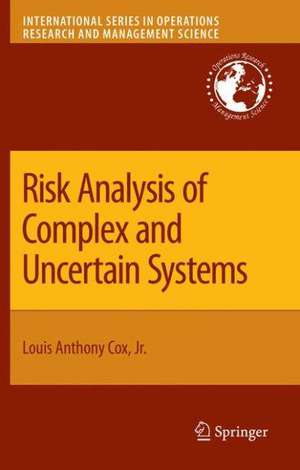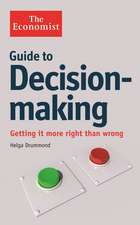Risk Analysis of Complex and Uncertain Systems: International Series in Operations Research & Management Science, cartea 129
Autor Louis Anthony Cox Jr.en Limba Engleză Paperback – 8 dec 2010
| Toate formatele și edițiile | Preț | Express |
|---|---|---|
| Paperback (1) | 1115.94 lei 6-8 săpt. | |
| Springer Us – 8 dec 2010 | 1115.94 lei 6-8 săpt. | |
| Hardback (1) | 1230.66 lei 6-8 săpt. | |
| Springer Us – 15 mai 2009 | 1230.66 lei 6-8 săpt. |
Din seria International Series in Operations Research & Management Science
- 20%
 Preț: 331.25 lei
Preț: 331.25 lei - 20%
 Preț: 570.61 lei
Preț: 570.61 lei - 18%
 Preț: 1132.02 lei
Preț: 1132.02 lei - 18%
 Preț: 773.72 lei
Preț: 773.72 lei -
 Preț: 170.39 lei
Preț: 170.39 lei - 17%
 Preț: 459.34 lei
Preț: 459.34 lei - 17%
 Preț: 360.47 lei
Preț: 360.47 lei -
 Preț: 263.40 lei
Preț: 263.40 lei - 24%
 Preț: 905.30 lei
Preț: 905.30 lei - 17%
 Preț: 460.08 lei
Preț: 460.08 lei - 17%
 Preț: 459.34 lei
Preț: 459.34 lei - 20%
 Preț: 631.58 lei
Preț: 631.58 lei - 13%
 Preț: 448.62 lei
Preț: 448.62 lei - 18%
 Preț: 738.28 lei
Preț: 738.28 lei - 18%
 Preț: 1225.94 lei
Preț: 1225.94 lei - 18%
 Preț: 948.92 lei
Preț: 948.92 lei - 18%
 Preț: 703.88 lei
Preț: 703.88 lei - 18%
 Preț: 957.44 lei
Preț: 957.44 lei - 15%
 Preț: 651.84 lei
Preț: 651.84 lei - 20%
 Preț: 336.21 lei
Preț: 336.21 lei - 15%
 Preț: 641.03 lei
Preț: 641.03 lei -
 Preț: 404.29 lei
Preț: 404.29 lei - 18%
 Preț: 950.21 lei
Preț: 950.21 lei - 15%
 Preț: 649.06 lei
Preț: 649.06 lei - 18%
 Preț: 725.75 lei
Preț: 725.75 lei -
 Preț: 394.12 lei
Preț: 394.12 lei - 18%
 Preț: 951.47 lei
Preț: 951.47 lei - 15%
 Preț: 639.59 lei
Preț: 639.59 lei - 18%
 Preț: 773.06 lei
Preț: 773.06 lei - 18%
 Preț: 889.29 lei
Preț: 889.29 lei - 15%
 Preț: 655.60 lei
Preț: 655.60 lei - 15%
 Preț: 640.06 lei
Preț: 640.06 lei - 15%
 Preț: 583.93 lei
Preț: 583.93 lei
Preț: 1115.94 lei
Preț vechi: 1360.91 lei
-18% Nou
Puncte Express: 1674
Preț estimativ în valută:
213.56€ • 221.69$ • 178.07£
213.56€ • 221.69$ • 178.07£
Carte tipărită la comandă
Livrare economică 22 martie-05 aprilie
Preluare comenzi: 021 569.72.76
Specificații
ISBN-13: 9781441947031
ISBN-10: 1441947035
Pagini: 468
Ilustrații: XXVIII, 436 p.
Dimensiuni: 155 x 235 x 25 mm
Greutate: 0.65 kg
Ediția:Softcover reprint of hardcover 1st ed. 2009
Editura: Springer Us
Colecția Springer
Seria International Series in Operations Research & Management Science
Locul publicării:New York, NY, United States
ISBN-10: 1441947035
Pagini: 468
Ilustrații: XXVIII, 436 p.
Dimensiuni: 155 x 235 x 25 mm
Greutate: 0.65 kg
Ediția:Softcover reprint of hardcover 1st ed. 2009
Editura: Springer Us
Colecția Springer
Seria International Series in Operations Research & Management Science
Locul publicării:New York, NY, United States
Public țintă
ResearchCuprins
1 INTRODUCTION TO RISK ANALYSIS.- Quantitative Risk Assessment Goals and Challenges.- to Engineering Risk Analysis.- to Health Risk Analysis.- 2 AVOIDING BAD RISK ANALYSIS.- Limitations of Risk Assessment Using Risk Matrices.- Limitations of Quantitative Risk Assessment Using Aggregate Exposure and Risk Models.- 3 PRINCIPLES FOR DOING BETTER.- Identifying Nonlinear Causal Relations in Large Data Sets.- Overcoming Preconceptions and Confirmation Biases Using Data Mining.- Estimating the Fraction of Disease Caused by One Component of a Complex Mixture: Bounds for Lung Cancer.- Bounding Resistance Risks for Penicillin.- Confronting Uncertain Causal Mechanisms – Portfolios of Possibilities.- Determining What Can Be Predicted: Identifiability.- 4 APPLICATIONS AND EXTENSIONS.- Predicting the Effects of Changes: Could Removing Arsenic from Tobacco Smoke Significantly Reduce Smoker Risks of Lung Cancer?.- Simplifying Complex Dynamic Networks: A Model of Protease Imbalance and COPD Dynamic Dose-Response.- Value of Information (VOI) in Risk Management Policies for Tracking and Testing Imported Cattle for BSE.- Improving Antiterrorism Risk Analysis.- Designing Resilient Telecommunications Networks.
Recenzii
From the reviews:
“The new results of this book include many real life applications especially in health management. … More applications to the specialists are given throughout the book. The book is written for practitioners but I think it is quite useful for anyone interested in risk analysis and assessment. … Concluding, this is one of the best books on quantitative risk assessment. I strongly recommended it to anyone interested in reducing risk in this highly volatile world.” (E. Ahmed, Zentralblatt MATH, Vol. 1168, 2009)
“The book is devoted to the development of quantitative risk assessment (QRA) for complex and uncertain biological, engineering, and social systems. … This book is written for practitioners using rational quantitative risk analysis in various areas. The methods and strategies included are good enough to help one make effective risk management decisions.” (Krzysztof Szajowski, Mathematical Reviews, Issue 2012 c)
“The new results of this book include many real life applications especially in health management. … More applications to the specialists are given throughout the book. The book is written for practitioners but I think it is quite useful for anyone interested in risk analysis and assessment. … Concluding, this is one of the best books on quantitative risk assessment. I strongly recommended it to anyone interested in reducing risk in this highly volatile world.” (E. Ahmed, Zentralblatt MATH, Vol. 1168, 2009)
“The book is devoted to the development of quantitative risk assessment (QRA) for complex and uncertain biological, engineering, and social systems. … This book is written for practitioners using rational quantitative risk analysis in various areas. The methods and strategies included are good enough to help one make effective risk management decisions.” (Krzysztof Szajowski, Mathematical Reviews, Issue 2012 c)
Textul de pe ultima copertă
"Tony Cox is among the most active and creative architects and users of quantitative risk analysis. This book is full of interesting equations, conceptual designs and conundrums that characterize QRA and its applications to risk management. Informed by trenchant thinking and perceptive writing, this is a timely resource for the risk analysis community." Michael R. Greenberg, Professor and Faculty Dean, Edward J. Bloustein School of Planning and Public Policy, Rutgers University
"Tony Cox's impressive book applies both simple and cutting-edge risk models to a variety of fields. It demonstrates creative but tractable ways to model real-world problems of great practical importance regarding biological, engineering, and social risks. This book deserves to become influential and widely read by those seeking practical state-of-the-art methods for risk analysis." Vicki Bier, Professor, Engineering Physics and Industrial Engineering & Director - Center for Human Performance and Risk Analysis, University of Wisconsin-Madison
"Risk analysis is as old as the first cave dweller mulling how to survive winter or woolly mammoths. It remains essential today in our world of accidents, disease, climate change and terrorism. But some say that quantitative risk analysis is too complicated or time-consuming, and that qualitative intuition is a better way to make decisions. In this ambitious and meticulous book, Tony Cox makes the case that quantitative risk analysis is actually the antidote to uncertainty and complexity, superior to other modes of thinking, both practical and effective. Cox raises the bar on a vital debate." Jonathan B. Wiener, Duke University, and President, Society for Risk Analysis (2008)
"This is an excellent, approachable read for any risk manager. Simple but devastating examples show hownot to do risk analysis. Insightful case studies apply quantitative risk assessment to natural, random threats, and to terrorist threats posed by an intelligent adversary. This is a timely and much-needed resource for skeptical consumers of risk analysis advice and products, and for those who need to improve upon current, dangerously simplistic, guidance on threat assessment and risk management." Gerald G. Brown, Distinguished Professor, Operations Research Department, Naval Postgraduate School, Monterey, CA
"This book provides a refreshing new perspective on quantitative risk assessment, and should be of interest to a wide range of practitioners. Drawing substantially on his own work, Tony Cox demonstrates that QRA can be applied even to challenging and complex systems." Suresh Moolgavkar, Vice President and Principal Scientist, Exponent Scientific Consulting; Professor of Epidemiology, University of Washington
"Tony Cox's impressive book applies both simple and cutting-edge risk models to a variety of fields. It demonstrates creative but tractable ways to model real-world problems of great practical importance regarding biological, engineering, and social risks. This book deserves to become influential and widely read by those seeking practical state-of-the-art methods for risk analysis." Vicki Bier, Professor, Engineering Physics and Industrial Engineering & Director - Center for Human Performance and Risk Analysis, University of Wisconsin-Madison
"Risk analysis is as old as the first cave dweller mulling how to survive winter or woolly mammoths. It remains essential today in our world of accidents, disease, climate change and terrorism. But some say that quantitative risk analysis is too complicated or time-consuming, and that qualitative intuition is a better way to make decisions. In this ambitious and meticulous book, Tony Cox makes the case that quantitative risk analysis is actually the antidote to uncertainty and complexity, superior to other modes of thinking, both practical and effective. Cox raises the bar on a vital debate." Jonathan B. Wiener, Duke University, and President, Society for Risk Analysis (2008)
"This is an excellent, approachable read for any risk manager. Simple but devastating examples show hownot to do risk analysis. Insightful case studies apply quantitative risk assessment to natural, random threats, and to terrorist threats posed by an intelligent adversary. This is a timely and much-needed resource for skeptical consumers of risk analysis advice and products, and for those who need to improve upon current, dangerously simplistic, guidance on threat assessment and risk management." Gerald G. Brown, Distinguished Professor, Operations Research Department, Naval Postgraduate School, Monterey, CA
"This book provides a refreshing new perspective on quantitative risk assessment, and should be of interest to a wide range of practitioners. Drawing substantially on his own work, Tony Cox demonstrates that QRA can be applied even to challenging and complex systems." Suresh Moolgavkar, Vice President and Principal Scientist, Exponent Scientific Consulting; Professor of Epidemiology, University of Washington
Caracteristici
Written by a leading authority in the field Shows practitioners how Quantitative Risk Analysis can improve risk management decisions and policies Demonstrates applications in complex and uncertain biological, engineering, and social systems Includes supplementary material: sn.pub/extras








